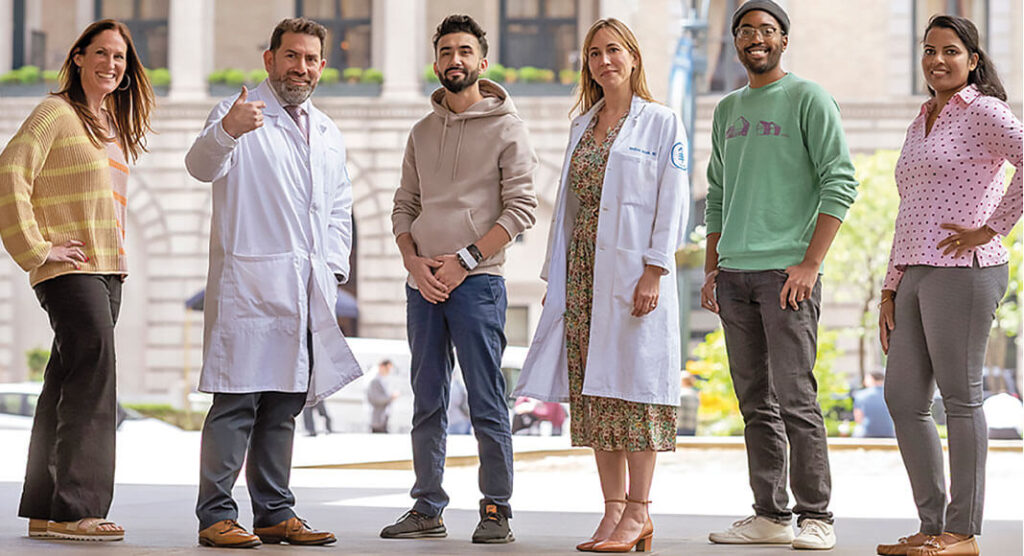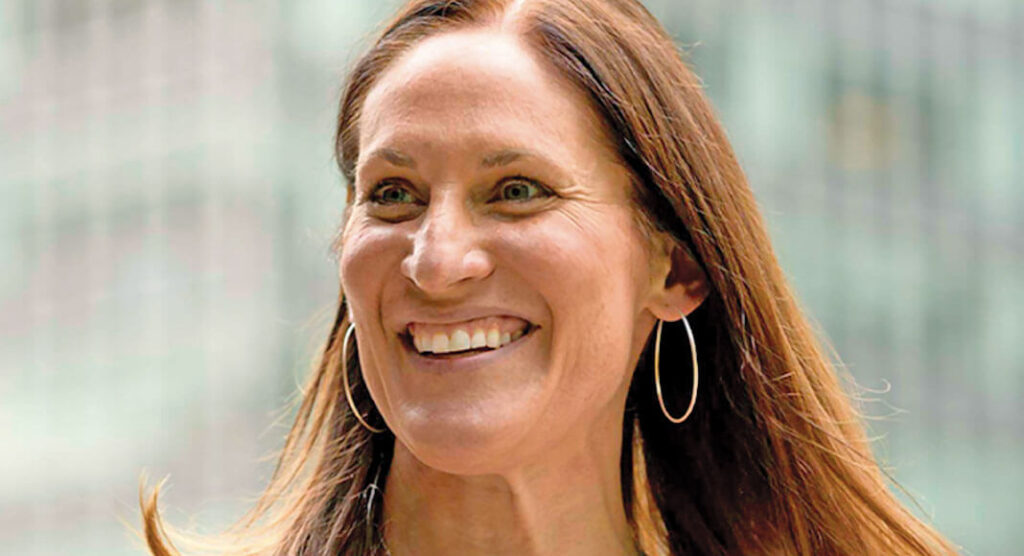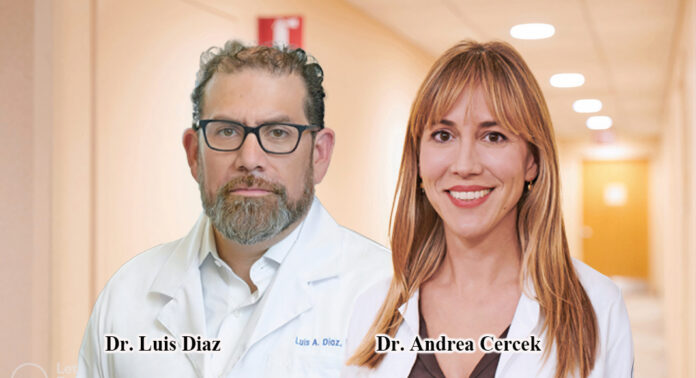Mega Doctor News
Sascha Roth remembers the phone call came on a hectic Friday evening.
She was racing around her home in Washington, D.C., to pack for New York, where she was scheduled to undergo weeks of radiation therapy for rectal cancer.
But the phone call from Memorial Sloan Kettering Cancer Center (MSK) medical oncologist Andrea Cercek changed everything, leaving Sascha “stunned and ecstatic — I was so happy.”
Dr. Cercek told Sascha, then 38, that her latest tests showed no evidence of cancer, after Sascha had undergone six months of treatment as the first patient in a clinical trial involving immunotherapy at MSK.

Immunotherapy harnesses the body’s own immune system as an ally against cancer. The MSK clinical trial was investigating — for the first time ever — if immunotherapy alone could beat rectal cancer that had not spread to other tissues, in a subset of patients whose tumor contain a specific genetic mutation.
“Dr. Cercek told me a team of doctors examined my tests,” recalls Sascha. “And since they couldn’t find any signs of cancer, Dr. Cercek said there was no reason to make me endure radiation therapy.”
100% Remission of Rectal Cancer

These same remarkable results would be repeated for all 14 people — and counting — in the MSK clinical trial for rectal cancer with a particular mutation. While it’s a small trial so far, the results are so impressive they were published in The New England Journal of Medicine and featured at the nation’s largest gathering of clinical oncologists in June 2022.
In every case, the rectal cancer disappeared after immunotherapy — without the need for the standard treatments of radiation, surgery, or chemotherapy — and the cancer has not returned in any of the patients, who have been cancer-free for up to two years.
“It’s incredibly rewarding,” says Dr. Cercek, “to get these happy tears and happy emails from the patients in this study who finish treatment and realize, ‘Oh my God, I get to keep all my normal body functions that I feared I might lose to radiation or surgery.’ ”
Her co-investigator, MSK medical oncologist Luis Diaz, Jr., is equally thrilled. He’s spent his career studying how to defeat cancer with immunotherapy. “It’s really exciting,” says Dr. Diaz, a member of the White House’s National Cancer Advisory Board. “I think this is a great step forward for patients.”
Using Immunotherapy Earlier To Target a Genetic Mutation

Drs. Cercek and Diaz explain that their team’s research was sparked by two key ideas.
The first premise, says Dr. Diaz, is to figure out precisely which patients benefit most from immunotherapy, so they can receive it right away. “Immunotherapy has proven successful in treating a subset of patients with colon and rectal cancer that has metastasized, meaning spread to other tissues.”
The patients in this subset, Dr. Diaz explains, have tumors with a specific genetic makeup known as mismatch repair-deficient (MMRd) or microsatellite instability (MSI).
Between 5% and 10% of all rectal cancer patients are thought to have MMRd tumors, including all the patients in the MSK clinical trial that Sascha participated in. There are 45,000 Americans diagnosed a year with rectal cancer.
“An MMRd tumor develops a defect in its ability to repair certain types of mutations that occur in cells. When those mutations accumulate in the tumor, they stimulate the immune system, which attacks the mutation-ridden cancer cells,” says Dr. Diaz, who heads the MSK division of Solid Tumor Oncology and holds the Grayer Family Chair.
But cancer has a trick up its sleeve to stop the immune system from doing its job.
Helping the Immune System Overcome Rectal Cancer
Immune cells contain a safeguard called a checkpoint, to prevent them from attacking normal cells. Cancer cells can trip this safeguard and shut down immune cells, allowing a tumor to hide and grow.
However, immunotherapy can turn the tables yet again.
An immunotherapy agent called a checkpoint inhibitor releases the brake on an immune cell, freeing it to recognize and attack cancer cells. “When the brakes are taken off the immune cells, MMRd cells look especially strange because they have so many mutations. So the immune cells attack with much more force,” explains Dr. Cercek.
Dr. Diaz’s pioneering research in treating cancer with immunotherapy had already shown that checkpoint inhibitors could “help people with MMRd colorectal tumors that have spread,” he says. “We thought, ‘Let’s try it before cancer metastasizes as a first line of treatment.’ ”
Avoiding Life-Altering Side Effects

The second premise of the clinical trial was to avoid the toxicity often associated with treatment for rectal cancer.
Dr. Cercek explains: “Our first duty is to save our patient’s life. But the standard treatment for rectal cancer with surgery, radiation, and chemotherapy can be particularly hard on people because of the location of the tumor.” She continues, “They can suffer life-altering bowel and bladder dysfunction, incontinence, infertility, sexual dysfunction, and more.”
Dr. Diaz notes, “Obviously, that can lead to a lot of self-esteem and psychiatric issues as well.”
To avoid these toxicities, many approaches to rectal cancer try to shrink the tumor as much as possible with chemotherapy and radiation to facilitate surgery. Drs. Cercek and Diaz surmised that immunotherapy in MMRd patients may similarly shrink the tumor to enable a more successful surgery.
But Dr. Cercek proposed going further: In patients where the immunotherapy caused the cancer to completely disappear, doctors would omit chemotherapy, radiation, and surgery — and, instead, closely monitor for any signs of recurrence. Dr. Diaz says this decision by Dr. Cercek was “a world-class moment” that promised to change the lives of patients — if it worked.
All patients in the trial must have stage 2 or 3 rectal tumors that are MMRd — which makes their cancer particularly sensitive to immunotherapy. The patients were given the checkpoint inhibitor dostarlimab (Jemperli) intravenously every three weeks, for six months.
Their tumors were closely tracked, Dr. Diaz explains, “using imaging, visualization such as endoscopy, as well other methods.”
No More Symptoms of Rectal Cancer
The results surprised even Drs. Cercek and Diaz.
“The immunotherapy shrank the tumors much faster than I expected,” says Dr. Cercek. “My research nurse Jenna Sinopoli would tell me, ‘The patient has only received one treatment and already they’re not bleeding anymore and their terrible pain has gone away.’ ” Dr. Cercek recalls: “Patients came to my office after just two or three treatments and said, ‘This is incredible. I feel normal again.’ ”
As the first patient to enroll in the trial, the research team was anxious that Sascha’s experience might prove to be an outlier. Sascha explains: “Before I came to MSK, oncologists at another medical center told me I needed chemo, radiation, and surgery. To instead get immunotherapy infusions every few weeks in New York with no side effects seemed like a cakewalk in comparison.”
It turned out Sascha was not an exception. Dr. Diaz recalls his growing excitement as “the first patient had a complete response to therapy and didn’t need anything else. Then the second patient didn’t need surgery or radiation. Then the third. Pretty soon we’re at the 10th patient that had a complete response. That is incredible.”
Patients, of course, were even more thrilled. “One young man and his family just sat in stunned silence when I told them his cancer had disappeared,” recalls Dr. Cercek. “Then they thanked us over and over.” She continues, “A young woman looked at the screen during an examination and asked, ‘Where is the tumor?’ ‘It’s gone,’ we told her.”
Dr. Cercek says: “The most exciting part of this is that every single one of our patients has only needed immunotherapy. We haven’t radiated anybody, and we haven’t put anybody through surgery.” She continues, “They have preserved normal bowel function, bladder function, sexual function, fertility. Women have their uterus and ovaries. It’s remarkable.”
Next Steps for Study Patients
Drs. Cercek and Diaz want people with rectal cancer tumors that are MMRd to know the clinical trial continues to enroll patients and is growing. Dr. Diaz says, “Our message is: Get tested if you have rectal cancer to see if the tumor is MMRd. No matter what stage the cancer is, we have a trial at MSK that may help you. And MSK has special expertise that really matters.”
That’s particularly important for people at high risk of rectal cancer. Sascha, like eight of the people in the study, was found to have Lynch syndrome, an inherited condition that puts people at significantly higher risk of rectal, colon, and other cancers.
Lynch syndrome is associated with poorer outcomes from chemotherapy and surgery, so treatment with immunotherapy may be an important new tool.
Similarly, there has been a disturbing rise in the number of people under 50 who are diagnosed with colorectal cancer — particularly rectal cancer. Dr. Cercek says: “We are seeing more and more young people with rectal cancer, including people in their 20s in our trial. Immunotherapy might be an important new option for them.”
MSK is also trying to help the growing number of younger patients with the Center for Young Onset Colorectal and Gastrointestinal Cancer. It’s the first center in the world devoted to the specific needs of people under 50 and is co-led by Dr. Cercek.
Potential Help for Other Cancers
As MSK’s rectal cancer trial continues, Dr. Diaz says he hopes “it’s the tip of the iceberg.” He explains that “we are investigating if this same method may help other cancers where the treatments are often life-altering and tumors can be MMRd. We are currently enrolling patients with gastric (stomach), prostate, and pancreatic cancers.”
Dr. Diaz has coined a term for this new method of using immunotherapy alone to target MMRd tumors, calling it “immunoablative” therapy — that means using “immunotherapy to replace surgery, chemotherapy, and radiation to remove cancer.” Dr. Diaz says, “That might sound futuristic — but in this trial, we have a clinical example where that happened.”
Today, nearly two years after she began the trial and remains cancer free, Sascha continues to live a normal life. She runs a family-owned home-furnishing and interior design business and often speaks to people facing rectal and other cancers.
“My whole experience has been like a dream,” she says. “MSK research and cancer care is simply years and years ahead of where other hospitals — even really good ones — are or should be.”
Luis Diaz is a member of the board of directors of Jounce Therapeutics and Epitope. He is a compensated consultant to PetDx, Innovatus, CP, Se’er, Delfi, Kinnate, and Neophore. Dr. Diaz is an inventor of multiple licensed patents related to technology for circulating tumor DNA analyses and mismatch repair deficiency for diagnosis and therapy. Some of these licenses and relationships are associated with equity or royalty payments to the inventors. He holds equity in Epitope, Jounce Therapeutics, PetDx, Se’er, Delfi, Kinnate, and Neophore. He divested his equity in Personal Genome Therapeutics to LabCorp in February 2022 and divested his equity in Thrive Earlier Detection to Exact Biosciences in January 2021. His spouse holds equity in Amgen. The terms of all these arrangements are being managed by Memorial Sloan Kettering in accordance with their conflict-of-interest policy.
Dr. Cercek receives research funding from GSK, Inspirna, and Seagen. She serves on the Advisory Boards of Bayer, Merck, Janssen, GSK, and Seagen.
Source: Memorial Sloan Kettering Cancer Center










